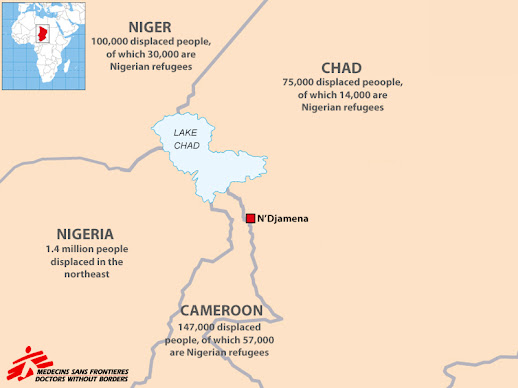Hi guys! I hope you had a nice reading week. This post will review the causal relationship between forced migration, water scarcity and ethnic violence in the Lake Chad Basin, particularly enhanced by Boko Haram insurgency.
First, since 2013, the violent attacks of Boko Haram have resulted in forced migration and displacement of people in the region which in turn, have largely contributed to the deepening of an ethnic crisis around the Lake Chad Basin (Kanu, Bazza, Omojola, 2019). The Boko Haram-displaced people come essentially from the Borno State and the larger North-Eastern region in Nigeria, which accounts for 1.4 million forced migrants (Médecin Sans Frontières, 2015).

The wide influx of newly arrived people, most often in Chad, where the basin still offers a decent amount of freshwater, have led to the creation of new settlements and temporary migrant’s camps around the basin (Okpara, Stringer, Dougill, 2016). Although I do not wish to sustain the cliché image of ‘The Starving African who wanders in refugee camps’ (Waimaima, 2019), the migrants’ lives in the settlements have been described as lacking access to basic needs such as water and food. These sites gather an important diversity of ethnic and religious groups whose interactions and cohabitation are sometimes confrontational. Furthermore, the excessive displacements of northern communities due to Boko Haram have led to a reluctance from the locals to help and integrate the newly arrived people.

Moreover, the unfolding forced migration and ethnic tensions occur in a context of region-wide human and resource insecurity as we have examined along the past four posts. Population pressure is added to the prevailing issues of climate change, political instability, underdevelopment, exacerbated poverty and decline of the lake’s natural resources (
Okpara, Stringer, Dougill, 2016). Ethnic conflicts have further undermined the region’s economy and reputation, as the evidenced state failure to secure the Lake Chad Basin and its foreign investors’ interest (
Kanu, Bazza, Omojola, 2019).
The consequent competition over the limited access to freshwater has been locally reflected by disputes at water points, poor mutual aid and inter-ethnic blame for environmental degradation (
Okpara, Stringer, Dougill, 2016). Such confrontations have been increased by scarce local infrastructures and high seasonality which deeply influence the quantity and quality of the lake’s resources (
Okpara, Stringer, Dougill, 2016).
Kreamer claims water scarcity to be a catalyst of ‘tribal and ethnic warfare’ (
2012). Although the term of ‘tribal’ seems problematic because vulnerable to misrepresentations (
Waimaima, 2019), I agree with him to say that water appears as an instrument of ethnic violence in the Lake Chad Basin. Indeed, water scarcity has been one of the reasons of ethnic tensions. The high pressure put on the region to reach its development goals has deeply intensified the competition between individuals, villages, regions and countries around the lake. Additionally, tension is heightened by the arbitrarily-claimed access and unequally-distributed water points (
Kreamer, 2012). Yet, water stress appears also as a tool of ethnic conflict, most often represented by the contamination or bombing of water points, as the anti-governmental ethnic groups did in the village of Tina and Khasan Basao in Sudan in 2003 and 2004 (
Kreamer, 2012).
In other words, Boko Haram’s forced migration has led to the intensification of ethnic conflicts due to the increased pressure on population and development targets as well as the limited and competitive access to water. The instrumentalisation of water as both the source and effect of ethnic violence in the region portrays the significant role of water in the politics and conflicts of the Lake Chad Basin. Clashes among the lake’s population further undermine attempts at regional cooperation and peace-building efforts for environmental, humanitarian and economic improvements. It complexifies even more the interconnected unstable socio-political context of the lake.
Thank you for reading, see you soon for another post!




Hi Léa, what an interesting post. I find really refreshing how you manage to talk about migration without sustaining the cliches that we see in so many European media. I was wondering if the refugee camps were protected from Boko Haram or if sometimes they were also attacked by the terrorist group? Keep up the good work!
ReplyDeleteThank you Beatrice for your comment. To answer your question: no, quite the opposite in fact, these camps are flourishing around the Lake Chad region as more and more people are fleeing Boko Haram-controlled regions, especially in Nigeria. These camps are most often run by humanitarian organisations such as Medecins Sans Frontieres. I haven't come across any case of terrorist attacks in temporary settlements but this is something I would have to further research!
Delete